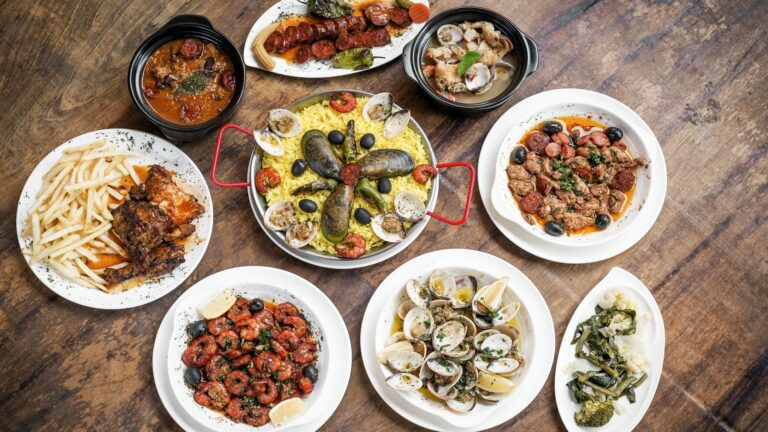Introduction: Portuguese Cuisine
Portuguese cuisine is one of the most diverse and unique in Europe, blending flavors and techniques from various sources, including Africa, Asia, and the Americas. However, the country’s most significant influences come from the Mediterranean and Atlantic regions. The Portuguese diet is known for its seafood, fresh vegetables, and hearty soups, as well as its love of spices and bold flavors.
Mediterranean Influences on Portuguese Cuisine
Portugal’s long history of trading with the Mediterranean region has significantly influenced its cuisine. The country’s use of olive oil, garlic, and herbs like parsley, coriander, and bay leaves all come from Mediterranean cuisine. Many of the dishes in Portuguese cuisine also use ingredients like tomatoes, onions, and peppers, which were introduced to the country by the Moors during their rule in the 8th century.
One of the most significant influences of Mediterranean cuisine on Portuguese cuisine is the widespread use of salt cod. This dish is a staple in Portugal and is often used in stews, salads, and other dishes. Cod was introduced to Portugal by the Basque fishermen in the 16th century, and the dish has since become an essential aspect of Portuguese cuisine.
Atlantic Influences on Portuguese Cuisine
The Atlantic Ocean has had a profound impact on Portuguese cuisine as well. The country’s long coastline and deep waters offer a bounty of fresh seafood, which is a crucial ingredient in many traditional dishes. Grilled sardines, octopus salad, and seafood stew (caldeirada) are all examples of dishes that showcase the Atlantic influence on Portuguese cuisine.
Another significant influence of the Atlantic on Portuguese cuisine is the use of salt in food preservation. Salt was widely used in the past to preserve fish and meat, and it is still a crucial ingredient in many traditional dishes today.
Shared Ingredients and Techniques
Both Mediterranean and Atlantic cuisines have had a significant impact on Portuguese cuisine, but there are also many shared ingredients and techniques. For example, all three cuisines use olive oil, garlic, and fresh herbs, and they all place a heavy emphasis on seafood. Grilling and roasting are common cooking techniques in all three cuisines as well.
Examples of Mediterranean and Atlantic Dishes in Portuguese Cuisine
Some of the most famous examples of Mediterranean and Atlantic dishes in Portuguese cuisine include Bacalhau (salt cod), Caldo Verde (a hearty soup made with kale and potatoes), Arroz de Marisco (seafood rice), and Cataplana (a seafood stew cooked in a copper pot).
Conclusion: The Unique Blend of Portuguese Cuisine
The influence of Mediterranean and Atlantic cuisines on Portuguese cuisine has created a unique blend of flavors and techniques that is unlike any other in Europe. The country’s reliance on seafood and fresh vegetables, as well as its use of spices and herbs, make Portuguese cuisine a delicious and healthy option for food lovers. Whether you’re trying Bacalhau for the first time or savoring a bowl of Caldo Verde, Portuguese cuisine is sure to delight your taste buds.

